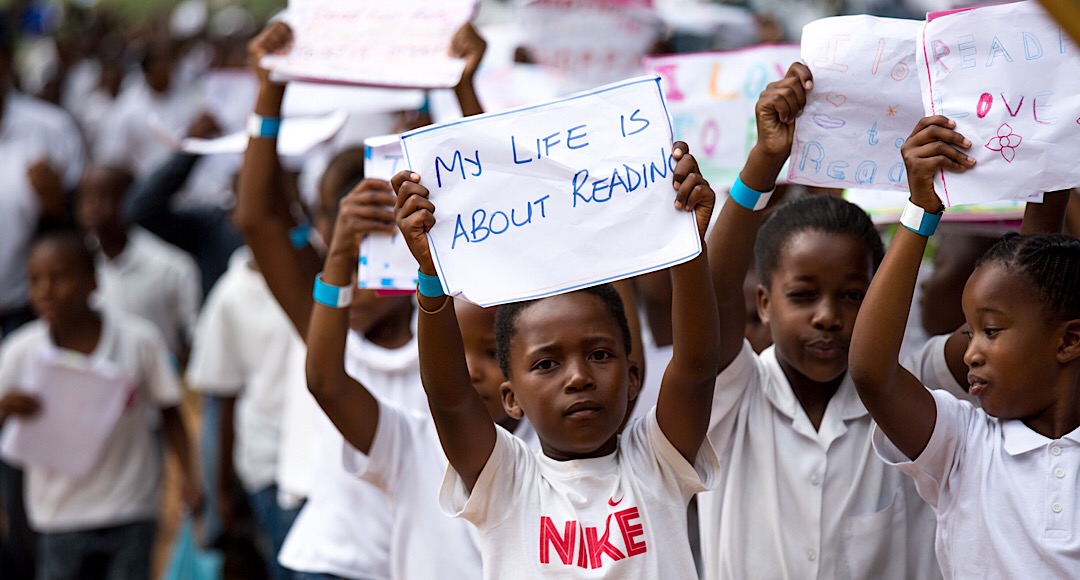February 1 marks World Read Aloud Day (WRAD). This is an international day which encourages people to read aloud to young people. Nal’ibali is a organisation that gets South Africans involved in the day.
Around the world for the past ten years, WRAD celebrations take place on February 1. Since 2013 WRAD celebrations took place in South Africa. The day happens in 173 countries around the world. It challenges participants to find an audience and read aloud to them.
Speaking to The Daily Vox, Petunia Thulo from Nal’ibali said: “Nal’ibali is a word from isiXhosa that means here is a story. It is a nationwide campaign which aims to spark children’s potential through reading, writing, storytelling, and reading aloud,” she said.
Why is reading aloud so important?
Thulo says the effects of reading aloud to children will follow them throughout their life. “Reading aloud to the kids in your life starts conversations [which] creates a bond between you as an adult and your child. There are many ways kids from a young age learn through oral and they are able to make connections between spoken word and written word,” she says.
In South Africa, the country could be heading for a crisis with a weak reading culture. A literacy survey conducted found that 78% of South African pupils could not read for meaning.
Thulo says it is for this reason the organisation wants to see more reading happen. “Everyday people brush their teeth and it’s like second nature to them so imagine a world where reading was something that happened every day, and almost automatically,” she says.
Nozizwe Cynthia Jele On Fixing South Africa’s Weak Reading Culture
“We believe kids who read to do well in their classrooms because they are able to read for understanding. They fall in love with books and stories – and their imaginations expand beyond their current abilities,” she says. Above just reading Nal’ibali wants to encourage people to read for fun and in their mother tongue.
What will be happening on the day?
Each year a commissioned brand new story by the organisation gets translated into all 11 official South African languages for WRAD. Jade Jacobsohn, managing director of Na’ibali said in a statement: “Then we encourage adults and caregivers across the country, to join us in reading it aloud to children on WRAD.”
The organisation encourages people to visit the Nal’ibali website, pledge the number of children they will be reading aloud to and then download the story for WRAD. “Imagine one big book club of sorts that’s what Friday is – one big reading event coming together. On Friday everyone will be reading the same story in all 11 different languages. That’s the action plan,” says Thulo.
Nal’ibali literacy mentors will be doing read aloud sessions around the country in Limpopo, Mpumalanga, Eastern Cape, Free State, KwaZulu-Natal and in the Western Cape. The mentors will be at different primary schools and early learning centres reading to children.
“Last year, with the help of our network partners and the public, we managed to read to over a million children,” says Jacobsohn. “In 2019, our aim is to beat that record and reach 1.5 million!” she said.
Beyond WRAD
Thulo says the challenge after WRAD is getting people to continue to read aloud and make it a habit. The design of the website is a reading resource which is for creating the reading culture. Nal’ibali works with the department of education and local libraries to spread the resources and get more people reading.
“Beyond WRAD our mission is to create a [lasting] reading culture,” she said.
If you would like to join the Nal’ibali’s World Read Aloud Day:
1. Visit www.nalibali.org or www.nalibali.mobi to download the official story in any of the languages.
2. Pledge the number of children you will be reading to.
3. Share pictures of read-aloud sessions on the Nal’ibali’s Facebook and Twitter platforms: @NalibaliSA, or use the hashtag #WRADChallenge2019 on the day.









